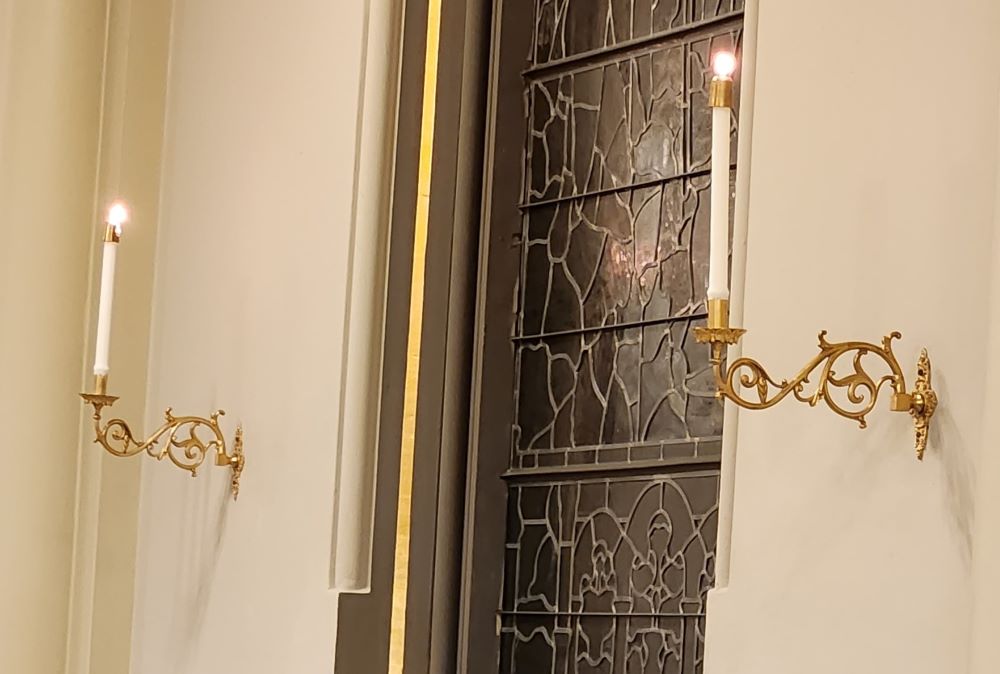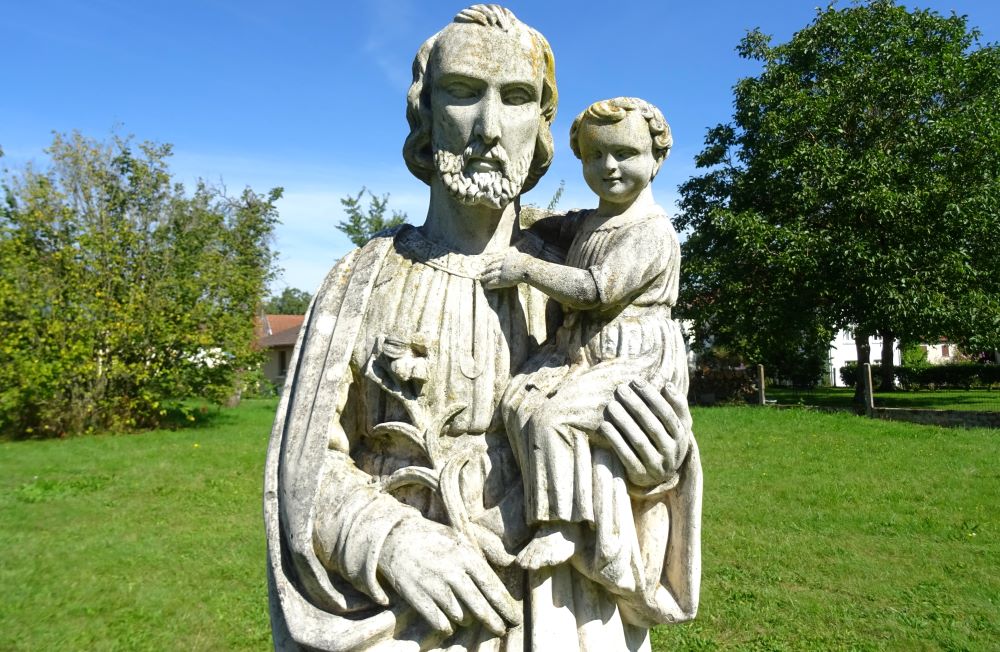
The School Sisters of St. Francis in Milwaukee, Wisconsin, light these candles around their chapel only on the feast of St. Joseph, March 19. (Jane Marie Bradish)
Every community has feast day celebrations. We celebrate our foundation day (province or entire congregation or both) and the death days of founders. Canonical orders celebrate the "Saint of their Rule." The celebrations extend in logical ways: For example, many Franciscans also celebrate St. Clare. But think for a moment about celebrations that might be head-scratchers, especially for people outside our communities.
Our original foundation house was in what is now known as Campbellsport, Wisconsin, and our international motherhouse (and within it, our chapel) are named not for any Franciscan, but for Joseph. On March 19, my Franciscan community celebrates the feast of St. Joseph. It's the only day of the year we light the candles on the chapel's walls.
Don't get me wrong: Joseph is a good guy. He was minding his own business, preparing to start life with his betrothed, Mary, when an angel dropped in and really messed up his life. The amount of faith he had to have to say "OK" while having no clue what would be in store is the kind of faith I can only hope for. Joseph stepped up.
The quiet, unassuming carpenter from the middle of nowhere gets thrust into a life of chaos because he listened to that angel. He becomes a dad while being forced to travel to his homeland for the census. He becomes a refugee with his new wife and son after being warned by that same pesky angel that the authorities are looking to kill his son. Scripture does not tell us when he and his new family are able to return home. And we hear very little more about him.

This statue of St. Joseph stands in the garden of the former convent of the Annonciades Sisters in Langrenes, France. (Wikimedia Commons/Olive Titus)
So why did we religious women name so many of our buildings/institutions after him and why do we continue to celebrate him? Our foundation stories consistently tell of Joseph showing up when we were in dire straits. Our foundresses were a part of another religious community in their native Germany. Governmental restrictions in the Kulturkampf of the late 1800s basically dissolved the community, and the women needed to figure out what to do. Do they stay as laywomen in the vital ministry they were a part of at the time, or do they relocate to continue living as vowed religious?
Legend has it Joseph appeared to our three foundresses while they were in prayerful discernment and said something along the lines of "In God’s name, go to America." And so it began: They came and, after a few false starts, they settled down and we got our start as a congregation. Whenever a need arose, the sisters were told to pray to Joseph, and he showed up and helped. When mortgage payments were due, Joseph was around making sure they could pay the bills. Joseph plays a similar role in my congregation, as indicated in Scripture, hanging around on the edges and "taking care of things."
After the most recent St. Joseph celebration, I started to think about other feast days that may not make sense at first glance. I wasn't named for a saint, scandalous as that may sound for the time. I was named for a family member, my name feminized and anglicized. So, I don't have a name day or patron saint. I do, however, have some feast days I celebrate for personal reasons, and I readily admit they are head-scratchers unless you know the back story.
I entered postulancy on the feast of the Transfiguration. We hear those readings twice a year, during Lent and on the feast on Aug, 6. The older I get, the more those readings make me squirm. Depending on what's happening at the time, I find myself like Jesus — consulting with the elders, or like the disciples in the story — pretty clueless and questioning the experience, or again like Jesus listening to the voice of God, who says: "You are my beloved."
I have a soft spot for St. Dominic. My first teaching job was with Dominican sisters. I was received into my Franciscan community on his feast day; the Dominicans I was working for and with at the time found that extremely funny. I have to admit, I didn't know it was Dominic's feast day until they told me why they wouldn't be present for my reception into the novitiate. They had their own community celebrations that day! When I'm permitted to preach, I fondly recall Dominic and the Dominican Sisters I taught with so many years ago.
Advertisement
Peter and Mary Magdalene are my favorite biblical saints, and I celebrate their feasts on June 29 and July 22, respectively. Peter sometimes comes across as a bumbling fool. He tried so hard, but — more often than not — messed things up. He did, however, come through in the end, stepping forward to lead after the death of Jesus. He reminds me of our common human condition in which we all share a part. I try and often succeed, but there are times I am just as much the bumbling fool as Peter.
Magdalene, so often misunderstood and/or misrepresented, is the first to proclaim the resurrection. She and her female companions didn't hide like most of Jesus' friends and followers. I don't know if they were exceptionally brave or simply just didn't care. She took her place in history telling everyone she encountered Jesus' most profound miracle, the resurrection.
My personal feast celebrations don't compare to the grand liturgies and social gatherings of my congregation, and they don't need to. What's important to me is that I take some extra time to pray and reflect and see where the feast leads me; it's never the same. It's also important to share something about my celebration of those feasts with someone else.
I'm sure each of us has our own list, either personally or congregationally. What are your head- scratcher feasts? How do you celebrate and, maybe most important, who knows about them?





